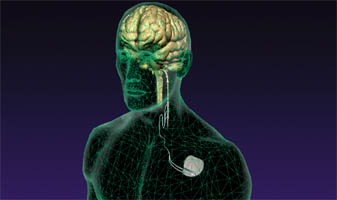Help for depression and anxiety Therese Borchard
Sanity Break
Transcranial Magnetic Stimulation Offers Hope for Treatment-Resistant Depression
Published Sep 29, 2014
In December of 2012, Stephanie S. was taking 300 mgs of sertraline (Zoloft), 300 mgs of (bupropion Hcl) Wellbutrin, 300 mgs of trazodone hydrochloride (Desyrel), 200 mgs of risperidone (Risperdal), and 8 mgs of alprazolam (Xanax), but was as depressed as she has ever been. She had also gained 100 pounds as a side effect of all the medications. Having tried a total of 10 different kinds of drugs with no success, her doctor recommended transcranial magnetic stimulation (TMS), a non-invasive procedure that stimulates nerve cells in the brain with short magnetic pulses. A large electromagnetic coil is placed against the scalp which generates focused pulses that pass through the skull and stimulate the cerebral cortex of the brain, a region that regulates mood. The procedure was approved by the FDA in 2008.
She didn’t feel any difference after 11 treatments, but she can vividly remember the morning after her 12th treatment. She explained:
I woke up… I mean WOKE UP!! I felt so light, instead of feeling weighed down. The sun was brighter. My overall feeling was JOY. This was unfamiliar to me, and I loved it. I came downstairs grinning from ear to ear and just looked at my husband. He knew! I just threw my arms around his neck and laughed. The feeling was indescribable. It was NIRVANA!! I felt better than I had felt before my breakdown. It was MAGICAL! I think that was the first time in my life that I felt pure joy!
She continued and finished the 30 treatments.
Dr. Kira Stein, MD, board certified psychiatrist and medical director of West Coast TMS Institute in Sherman Oaks, Los Angeles, is excited about the success she’s had in treating her patients with TMS. She usually does five sessions a week, for a total of 30 sessions; the entire procedure lasts about six to eight weeks, though some patients may need more treatment to respond.
She estimates that about one-third of TMS patients have a full remission and no longer experience depression symptoms.
One-half of TMS patients respond signficantly, where their depression symptoms are improved by at least 50 percent, but do not reach complete remission. The more depressive cycles they have had in their lives, the more difficult it is to treat them in general.
Dr. Stein’s experience is that TMS success rates are higher when TMS is used as an augmentation strategy for patients who have only partially responded to medication, or who cannot tolerate higher medication doses. She usually recommends a person stay on a dose of maintenance antidepressants and finds that some patients need maintenance TMS treatments to stay well.
The treatment is expensive. Dr. Stein says that each session (and on average people usually require 30) run from $300 to $450, a session; however, more and more insurance companies are picking up at least some of the bill.
Stephanie paid $7,450 out of pocket. Her insurance chipped in $7,000 (the total cost was about $14,000).
Stephanie stayed in remission for a year and a half until a cascade of tragic events, including the suicide of her sister, caused a relapse of depressive symptoms. When different kinds of medication again did little to relieve her pain, she decided to do TMS for a second time.
She’s been participating in the online depression support group I moderate on Facebook. About a month ago, I remember a distinct change in the tone of her posts. They went from being desperate to hopeful, from cynical to curious, and from flat to playful.
“What’s the matter with me?” she asked the group. “On the way to my husband’s work, I’m noticing everything for the first time.”
“I think your TMS treatment is working,” I replied.
“Yes!” she said. “I laughed again!!”
She has eight treatments left, and hopes she continues to laugh for a very long time.
Posted in: Depression

No comments:
Post a Comment